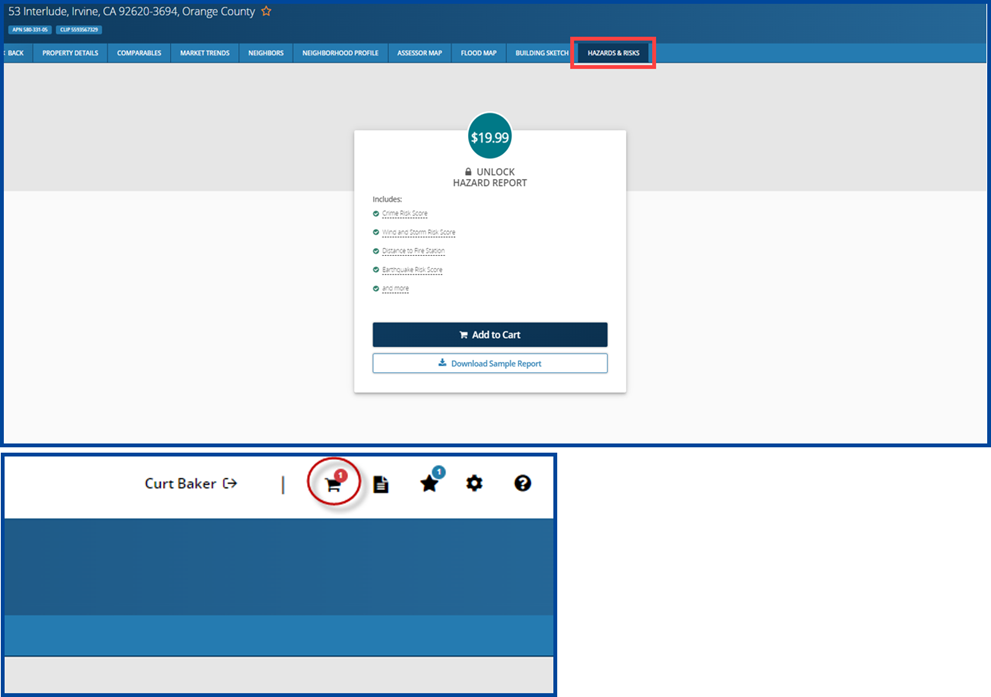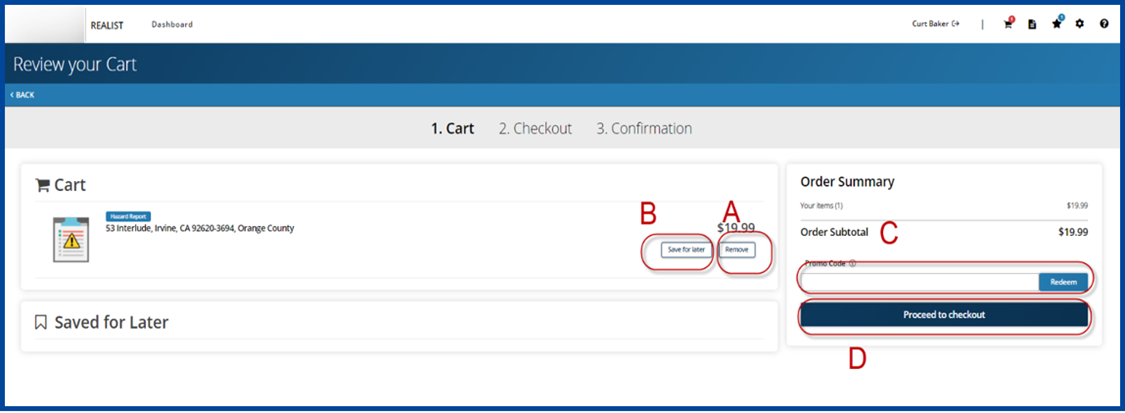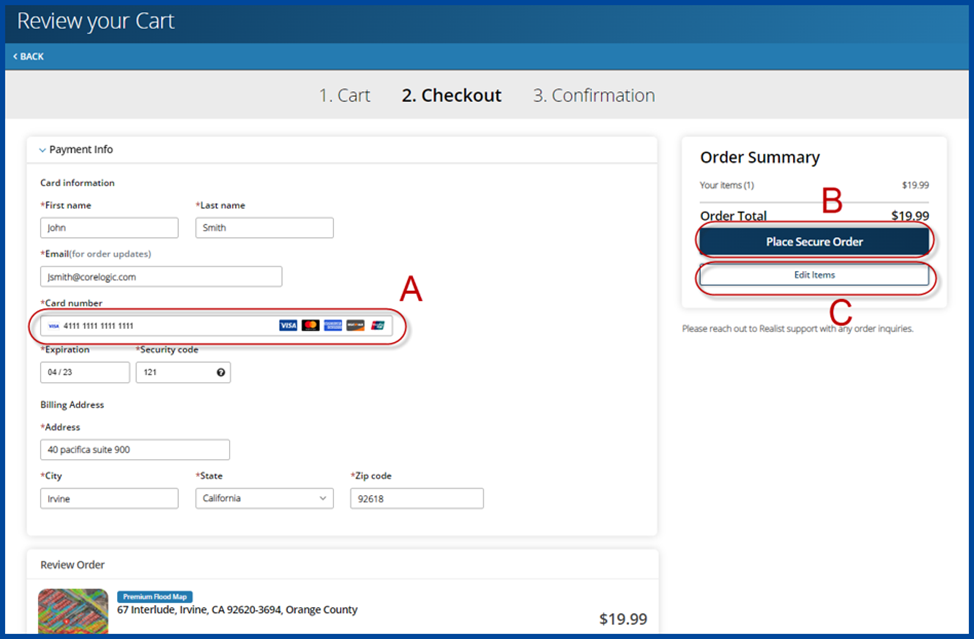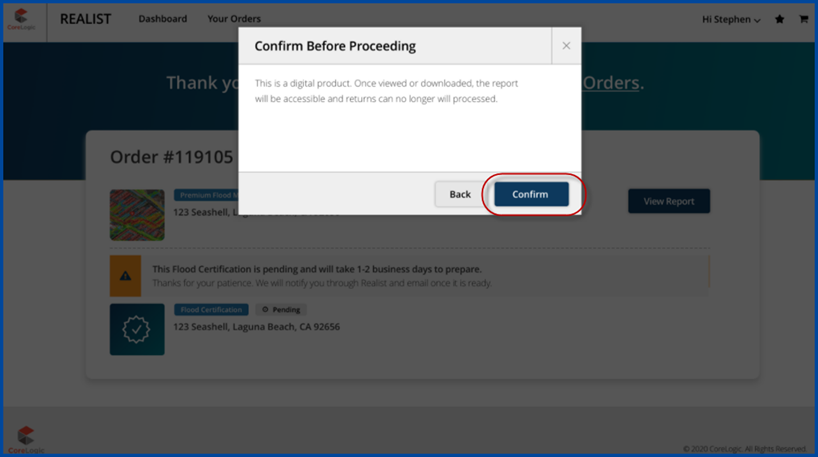Realist: Hazards & Risks Report
The new Realist Hazards & Risks report from CoreLogic® provides property-level information for a variety of risk types:
- Earthquake – Probability, severity (shaking/damage), soil types, and spectral acceleration
- Wildfire – Based on a combination of brushfire data, proximity to high-risk areas, recent fires, and more factors
- Wind & Storm – Tornadic, straight-line, and hurricane event risk
- Crime – Neighborhood statistics for common property and violent crimes
- Regional – Including hail, lava, tsunami, and sinkhole risks
- Distance to Fire Station – An important first-responder metric
- Roof Age – Based on construction and permit data
Add Hazards & Risks Report to cart
To begin using the Hazards & Risks Report, search for the subject property and then click on the View Property Details Report. From here you can access the Hazards & Risks report tab. Click on this tab and follow the steps below to add to your cart and purchase:
Steps to Purchase:
- Click on Hazards & Risks Report tab
- Click Add to Cart (Note: You can add multiple Hazards & Risks reports for different properties to your cart prior to checkout)
- Click on the Shopping Cart icon at top left to proceed to Checkout
- On the Cart page you will see the following options:
-
- A) Remove product from shopping cart
- B) Save cart
- C) If you have a valid promo code, enter it into the Promo Code field and then select Redeem
- D) Click Proceed to checkout to move to the credit card information screen
- On the Checkout page:
-
- A) Enter your credit card payment information and billing address
- B) Select Place secure order
- C) To add or remove items from your cart, click Edit items
Access your Hazards & Risks Report after purchase
Order Confirmation Page
Once your Hazards & Risks Report purchase is complete, you will see a confirmation page. If you purchased multiple reports during one transaction, each report will appear on the same Order Confirmation page.
Each report will have its own View Report link. Due to the length of the Hazards & Risks report, we’ve also made the Glossary PDF a separate file for download. You can access this file on the order confirmation page and the “Your Orders” page.
Acknowledgement of Refund Policy
Because the Hazards & Risks Report is a digital product, Realist will not accept returns after you view or access the report content. Before viewing the Hazards & Risks Report content, you must acknowledge and confirm your understanding by clicking Confirm.
Understanding each risk profile
The Hazards & Risks Report provides property-level information for a variety of risks. See below for more details on each risk profile, description, and rating.
Crime Risk Score
CoreLogic, the developers of Realist, provides the most detailed national database of neighborhood crime statistics available through Location Inc., a CoreLogic company. CrimeRisk™ data contains no data about race, color, religion, national origin, sex & orientation, marital status, age, or disability. The database does include statistics for murder, aggravated assault, larceny, robbery, property crime, motor vehicle theft, rape, burglary, and overall total crimes.
| CrimeRisk Score & Description | |
| Risk Score | Risk Description |
| Very Low Risk (0-10) | Crime Risk half the national average or lower |
| Low Risk (11-20) | Crime Risk between half the national average and the national average |
| Moderate Risk (21-40) | Crime Risk from national average to twice the national average |
| High Risk (41-60) | Crime Risk from two to three times the national average |
| Very High Risk (61-80) | Crime Risk from three to four times the national average |
| Extreme Risk (81-99) | Crime Risk from four to five times the national average |
| Very Extreme Risk (100) | Crime Risk five times the national average or higher |
Earthquake Risk Score
Earthquake Risk Score predicts a location’s risk for earthquake damage, along with the potential earthquake severity.
The Earthquake Risk Score incorporates the most current earthquake science and data available. The information intends to serve as an indicator of the extent of ground shaking that could occur at a location in the event of seismic activity. The model combines factors to determine an overall earthquake risk score, ranging from Very Low to Very High risk with a scoring system from 1-100; 100 being the highest risk.
| Earthquake Risk Score & Description | |
| Risk Score | Risk Description |
| 1-19 | Very Low |
| 20-24 | Low |
| 25-60 | Moderate |
| 61-80 | High |
| 81-100 | Very High |
Wind & Storm Risk Score
Wind Risk Score provides information about a location’s risk score on a 1-100 scale, with 100 as the highest risk for tornadic, straight-line, and hurricane wind events.
Wildfire Risk Score
CoreLogic’s Wildfire Risk Score combines brushfire data and proximity to higher risk areas and wildlands to provide an accurate assessment of a property’s exposure to risk. Recent fire activity in the area may actually lower the Risk Description and Score, because accelerant and fuel often deplete after consumption in a fire event. The Risk Score calculates this in the year following the fire, but the reduction is temporary.
| Wildfire Risk Score & Description | |
| Risk Score | Risk Description |
| Low (0-50) | Minimal wildfire threat. Possible ember ignitions based on more distant fuels. |
| Moderate (51-60) | Increased wildfire threat due to closer proximity to ember sources. |
| High (61-80) | Elevated wildfire threat. Ember ignitions from nearby or adjacent fuel sources or possible higher risk fuels on the property. |
| Very High (81-100) | Extreme wildfire threat. Not only embers from nearby fuels but likely higher-risk fuels on the property or in close proximity |
Regional Risks
Tsunami
The Tsunami Risk shows you planned areas of evacuation in the event of tsunami. This feature covers the states of California, Hawaii, Oregon, and Washington. It is based on source data available from the Pacific Disaster Center, the National Geophysical Data Center, the Washington Department of Natural Resources, and the California Department of Conservation.
Hailstorm Risk
This report provides a Hail Claim Score (1-100) based on the probability that a property owner will submit a hail claim. The report also includes a Hailstorm Risk Score (1-100), which calculates the possibility of 1″ hailstones impacting the property, along with the annual probability of hailstones from 0.75″ to over 2″ in size. These scores come from analyzing CoreLogic Hail Verification Technology, Storm Prediction Data, and North American Regional Reanalysis data.
Sinkhole Risk
This report uses ground composition data, a comprehensive database of known sinkholes, and scientist-developed methodology that analyzes factors contributing to possible ground collapse. In addition to risk level, the “Sinkhole Integrated” report also provides the distance and status of sinkholes within user-defined distances from the subject property.
Lava
The Hazards & Risk Report can provide lava flow hazard zone information for Hawaii’s largest island. The lava flow hazard zone depictions in this report come from the United States Geological Survey (USGS) and Hawaii Volcanoes Observatory.
Distance to fire station
This report includes the distance, in feet, to the three nearest fire stations.
Roof Age
Using building permit data, this report includes the age of a property’s roof. Both residential and commercial property reports contain this data. If Realist Tax does not find a permit, the report will use other data, such as year built, to estimate the age of the roof.





